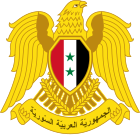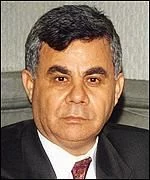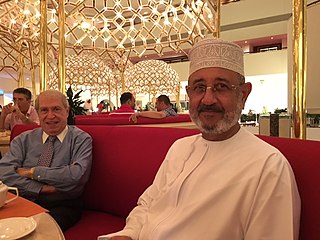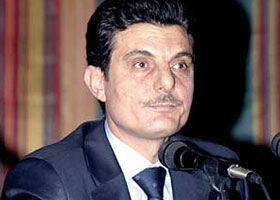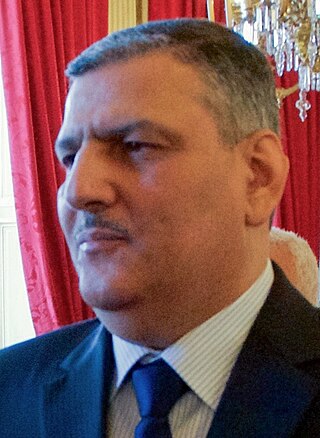Second Mustafa Mero government
(13 December 2001 – 10 September 2003) |
| Portfolio | Name | Party | Term of office | Ref. |
|---|
| Prime Minister | Muhammad Mustafa Mero | | Arab Socialist Ba'ath Party – Syria Region | 13 December 2001 – 10 September 2003 | |
| Deputy Prime Minister | Mustafa Tlass | | Arab Socialist Ba'ath Party – Syria Region | 13 December 2001 – 10 September 2003 | |
| Deputy Prime Minister for Services | Muhammad Naji al-Otari | | Arab Socialist Ba'ath Party – Syria Region | 13 December 2001 – 10 September 2003 | |
| Deputy Prime Minister | Farouk al-Sharaa | | Arab Socialist Ba'ath Party – Syria Region | 13 December 2001 – 10 September 2003 | |
| Deputy Prime Minister for Economic Affairs | Muhammed Al Hussein | | Arab Socialist Ba'ath Party – Syria Region | 13 December 2001 – 10 September 2003 | |
| Minister of Foreign Affairs | Farouk al-Sharaa | | Arab Socialist Ba'ath Party – Syria Region | 13 December 2001 – 10 September 2003 | |
| Minister of Finance | Muhammad Al Atrash | | Independent | 13 December 2001 – 10 September 2003 | |
| Minister of Defense | Mustafa Tlass | | Arab Socialist Ba'ath Party – Syria Region | 13 December 2001 – 10 September 2003 | |
| Minister of Higher Education | Hassan Risheh | | Arab Socialist Ba'ath Party – Syria Region | 13 December 2001 – 10 September 2003 | |
| Minister of Local Administration | Hilal Al Atrash | | Arab Socialist Ba'ath Party – Syria Region | 13 December 2001 – 10 September 2003 | |
| Minister of Tourism | Saadallah Agha al-Qalaa | | Independent | 13 December 2001 – 10 September 2003 | |
| Minister of Agriculture and Agrarian Reform | Nureddine Muna | | | 13 December 2001 – 10 September 2003 | |
| Minister of Education | Mahmoud Sayyed | | | 13 December 2001 – 10 September 2003 | |
| Minister of Supply and Internal Trade | Bassam Muhammad Rustom | | | 13 December 2001 – 10 September 2003 | |
| Minister of Economy and Foreign Trade | Ghassan Al Rifai | | Independent | 13 December 2001 – 10 September 2003 | |
| Minister of Health | Muhammad Iyad Shatti | | | 13 December 2001 – 10 September 2003 | |
| Minister of Justice | Muhammad Nabil Al Khatib | | Arab Socialist Ba'ath Party – Syria Region | 13 December 2001 – 10 September 2003 | |
| Minister of Endowments | Muhammad bin Abd al Raouf | | | 13 December 2001 – 10 September 2003 | |
| Minister of Irrigation | Muhammad Radwan Martini | | | 13 December 2001 – 10 September 2003 | |
| Minister of Social Affairs and Labor | Ghada al Jabi | | | 13 December 2001 – 10 September 2003 | |
| Minister of Oil and Mineral Reserves | Ibrahim Haddad | | Independent | 13 December 2001 – 10 September 2003 | |
| Minister of Interior | Ali Hammoud | | Arab Socialist Ba'ath Party – Syria Region | 13 December 2001 – 10 September 2003 | |
| Minister of Information | Adnan Omran | | Arab Socialist Ba'ath Party – Syria Region | 13 December 2001 – 10 September 2003 | |
| Minister of Culture | Najwa Qassab Hassan | | | 13 December 2001 – 10 September 2003 | |
| Minister of Electricity | Munib Saem Dahr | | | 13 December 2001 – 10 September 2003 | |
| Minister of Construction | Hussam Asswad | | | 13 December 2001 – 10 September 2003 | |
| Minister of Housing | Ayman Waili | | | 13 December 2001 – 10 September 2003 | |
| Minister of Transport | Makram Obeid | | Independent | 13 December 2001 – 10 September 2003 | |
| Minister of Industry | Issam al-Zaim | | Arab Socialist Ba'ath Party – Syria Region | 13 December 2001 – 10 September 2003 | |
| Minister of Communication and Technology | Muhammad Bashir Monjed | | | 13 December 2001 – 10 September 2003 | |
| Minister of State for Presidential Affairs | Haitham Dweyhi | | | 13 December 2001 – 10 September 2003 | |
| Minister of State for Expatriates Affairs | Nasser Qaddour | | | 13 December 2001 – 10 September 2003 | |
| Minister of State for Environmental Affairs | Adnan Khuzam | | | 13 December 2001 – 10 September 2003 | |
| Minister of State | Faissal Jawish | | | 13 December 2001 – 10 September 2003 | |
| Minister of State | Abdelkarim Sayyed Youssef | | | 13 December 2001 – 10 September 2003 | |
| Minister of State | Abdelnasser Abdelmuti Dawoud | | | 13 December 2001 – 10 September 2003 | |
